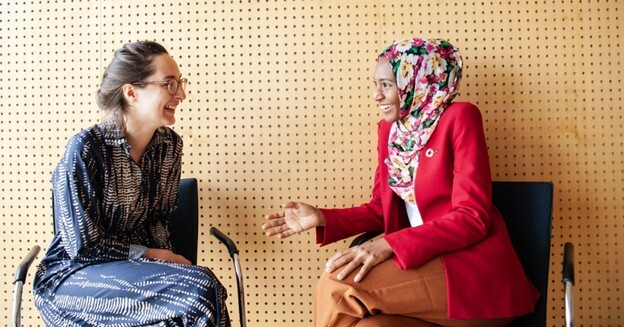
Welcome to this blog post on the podcast series Accelerating Sanitation and Water for All, we hope that you will enjoy some of AFREAU's reflections, as well as looking back over the process, the people, and the podcasts of this very exciting series.
Published on: 18/11/2024

Hello, we are Hadi from Mali and Eleanor from the United Kingdom, co-founders of AFREAU, a social enterprise based in Mali. We have experience in being on both sides of the podcasting table and look forward to our conversation as your hosts!
This is how the participants in several episodes of the Accelerating Sanitation and Water for All were introduced to the podcast, and how we introduce ourselves to you today. Welcome to this blog post on the podcast experience, and although it is not really a conversation, we hope that you will enjoy some of AFREAU’s reflections, as well as looking back over the process, the people, and the podcasts of this very exciting series.
At the end of the Accelerating Sanitation and Water for All programme, it was decided to dynamically capture the impact of the programme by producing a podcast series that brought the people of the projects to the fore. After (Hadi) received the IRC Connect Award for young professionals in the water and sanitation sector during the All Systems Connect symposium 2023, AFREAU was asked to host five podcast episodes on different topics, with unique interviewees from various countries:
What was involved in the process of making this podcast series? Well, we are glad you asked.
It is said that preparation takes 95% of the time… This, we discovered, is no less true for podcasting. Developing the questions that we used to steer the discussions was an exciting and collaborative process with the IRC and UNICEF teams. We wanted to make sure that we made the most of this unique opportunity by asking the right questions. Although good questions set the direction and course of the episode, we also wanted to maintain the authenticity of a good conversation. This meant that the dialogue had to have a flow that comes from genuine curiosity - which was not a problem given the content and the participants of the episodes. It was interesting to hear that some communities in rural Niger became open-defecation free thanks to the activism and inclusion of women and youth groups. Likewise, innovative approaches to financing both in Niger and Mozambique significantly improved WASH access for the communities, especially in schools and hospitals. The conversations intended to shed light on these important issues for both the implementers and the engaged listeners by capturing the successes of the projects. For example, there was a jump in drinking water accessibility from 50 to 67% in the commune of Kantche after the interventions. These are small steps in improvement and really well presented by the people who participated and brought the Accelerating Sanitation and Water for All programme to life.
That’s great to know, surely you did not do this all by yourselves - who was involved and who did you talk to? Alongside the programme, the podcasts would not have happened without the people behind them. This, we realized, is really where the magic happens. From those in the field, to the production studio, putting a podcast together takes a range of skills. Despite working in multiple languages, different cultures, across several continents and in countries without stable internet connections, no consistent power supply and in areas without high-tech podcasting equipment, we adapted.
Recordings were made in Rwanda between two conference sessions, in the UNICEF office in Burundi and sometimes working around the timing of the local mosque’s call to prayer in Bamako. The Accelerating Sanitation and Water for All programme has brought people together and it is through these narratives that the real change, in terms of improved access to water and sanitation services, needs to be taken up and lessons learnt have been shared.
What are final reflections that have stayed with you since the release of the podcast?
We loved the innovative approach to capturing impact, and monitoring, evaluation and learning through first-hand stories from local communities. This aligns strongly with AFREAU’s mission to support community-based interventions and empower communities to sustainably manage their water environment. Also, we enjoyed working with an incredible team who are willing to reflect on and share their experiences on the Accelerating Sanitation and Water for All programme and to give space to ideas and creativity. We will definitely take this into account in future AFR’EAU projects!
Our thanks go to the following people without whom these podcasts would not have been realised:
Arabella Northey, Anu Paudyal Gautam (UNICEF), Sara Bori, Vera van der Grift, Fadila Garba Saley, Rashid Malekela, Hadi Toure, Eleanor Treadwell, Sanata Thera, Malica Maiga, and the interviewees, Priscilla Ofori-Amanfo, and Hubert Onibon from UNICEF. James Conrad Massaquoi, a UNICEF Tanzania WASH Specialist, and contributors to the following two Niger podcasts : Adopter une approche municipale de l'eau, de l'assainissement et de l'hygiène au Niger :: IRC & La gouvernance et financement des services d'eau et d'assainissement au Niger :: IRC
At IRC we have strong opinions and we value honest and frank discussion, so you won't be surprised to hear that not all the opinions on this site represent our official policy.